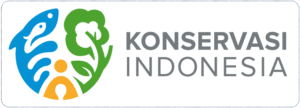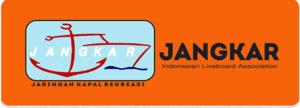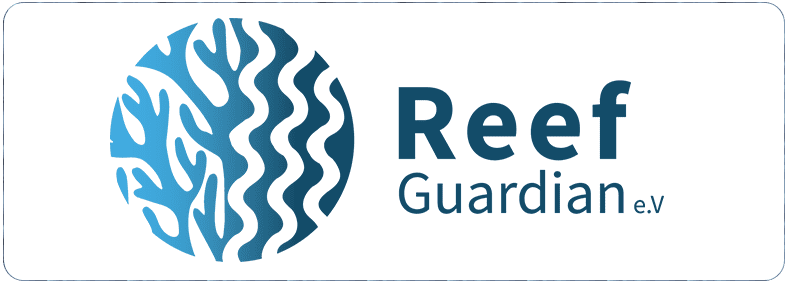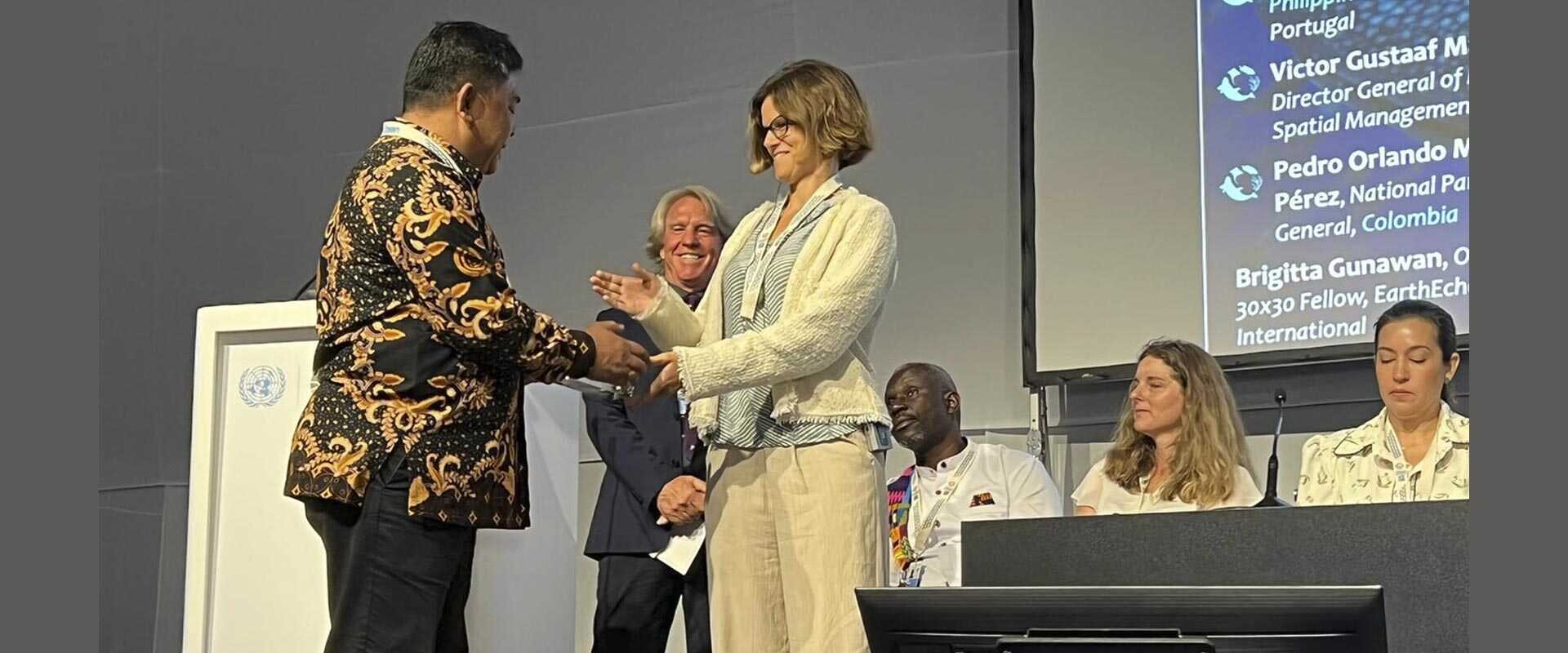Raja Ampat’s Blue Park Award: A Collaboration of Shareholders by Nikka Gunadharma* and Allan Fredrik Ramandey**
On a warm afternoon in early June, the speedboat, “Manta Ray”, tied up to Falaya’s jetty, close to Waisai, the capital of Raja Ampat. Of the four people onboard, three waited patiently until the boat was secure. But one, Imanuel Mofu, ‘Manu to his friends, hurried off the boat carrying data he’d just collected during the patrol he had been directing aboard “Manta Ray”. Soon, seated in the shade bordering the port’s active wharfs, ‘Manu turned his attention to writing up the results of the community-based patrol, one of the region’s many patrols, which monitor and manage the network of MPAs in Raja Ampat.
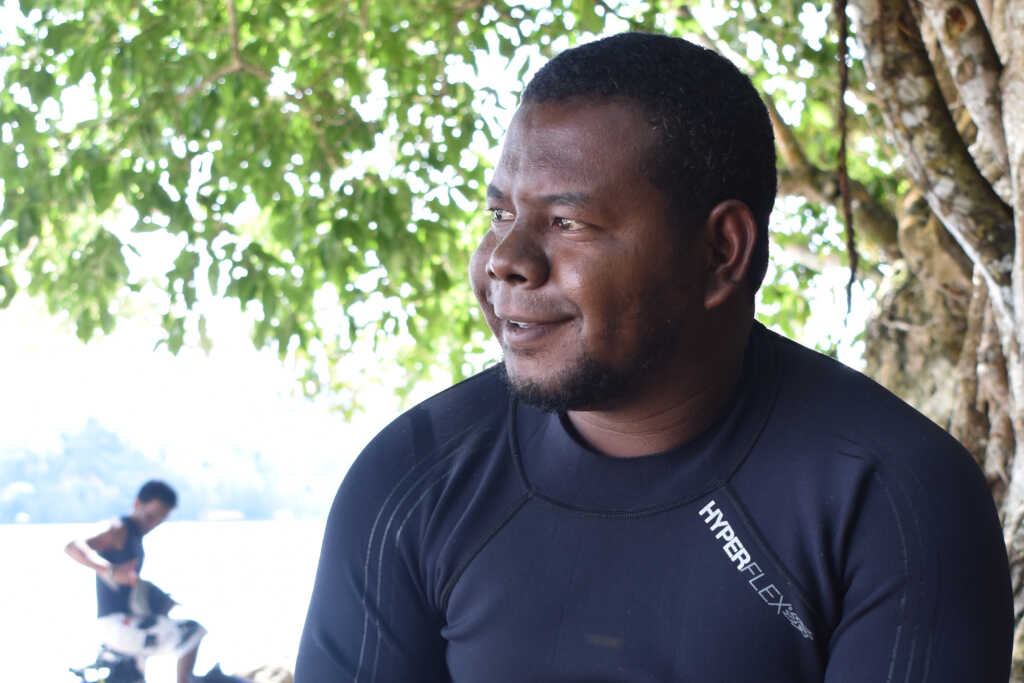
Imanuel Mofu is the Monitoring Staff’s Assistant and members of the community-based patrol for Raja Ampat Marine Park’s Authority. (Photo by: BLUD UPTD Pengelolaan KK di Perairan Kepulauan Raja Ampat/2019)
‘Manu’s work as a member of the Jaga Laut’s (the official name for Raja Ampat’s community-based patrols) monitoring staff stationed on Gam in the Dampier Strait, part of Raja Ampat’s MPA Network (under management of Raja Ampat’s Marine park Authority***) involves him directly with nearby communities. Each community-based patrol has a minimum service standard of eight patrols each month within each MPA. ‘Manu also assists several partner organizations with Reef Health Monitoring (RHM), rapid reef assessments and studies such as manta ray population surveys in Wayag Lagoon and the Fam Islands. ‘Manu is one of only 49 monitoring staff on patrolfor Raja Ampat’s MPAs. Considering the scope of ‘Manu’s duties, that number seems almost ineffectual when spread across Raja’s vast 1,348,459.47 hectare network of protected areas.
The communities do benefit, however, from the short-staffed patrols and monitoring personnel. The mere presence of these patrols deters illegal fishing activities including shark poaching, the use of illegal gill nets, and fish bombs. The patrols also check to make certain all tourists in the area have paid an entrance fee. ‘Manu says, “I’ve never felt bored when patrolling because I’ve seen the benefits of this Jaga Laut’s activities. Now the community can bring tourists to the area and provide some accommodations to earn income for the MPA while we make sure that the zoning and management plans are aligned to the requirements of the government and the community.”
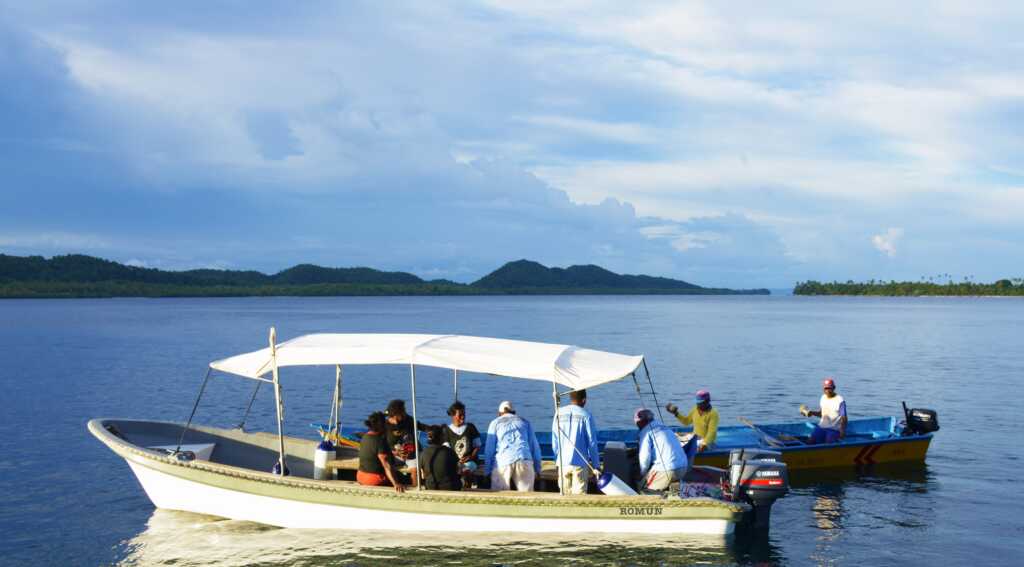
Jaga Laut’s activity in one of the MPAs managed by the Raja Ampat Marine Park’s Authority – Fam Islands MPA. (Photo by: Rens Lewerissa-CI Indonesia/2017)
Dedicated patrols and effective scientific monitoring that benefit local villages while promoting local stewardship of marine resources are the basis of Raja Ampat’s latest award from the world’s conservation and scientific community. On July 1, 2022 the Marine Conservation Institute (MCI) presented a Blue Parks Award for “Exceptional Marine Wildlife Conservation” to Raja Ampat’s MPA Network. This year’s Blue Parks award welcomed Raja Ampat into an elite group of 24 MPA networks recognized for their exceptional management by meeting scientific standards for effective conservation. The award, which was presented during the United Nations Ocean Conference, was also presented to protected areas in Philippines and Colombia.
Begun in the early 2000s, the establishment and development of Raja Ampat’s MPAs were a collaborative effort between communities, governments, and non-governmental organizations such as The Nature Conservancy (TNC), its main partner in Indonesia is now Yayasan Konservasi Alam Nusantara (YKAN), Conservation International (CI), its main partner in Indonesia now is Konservasi Indonesia (KI)****, and World Wide Fund for Nature (WWF) Indonesia.
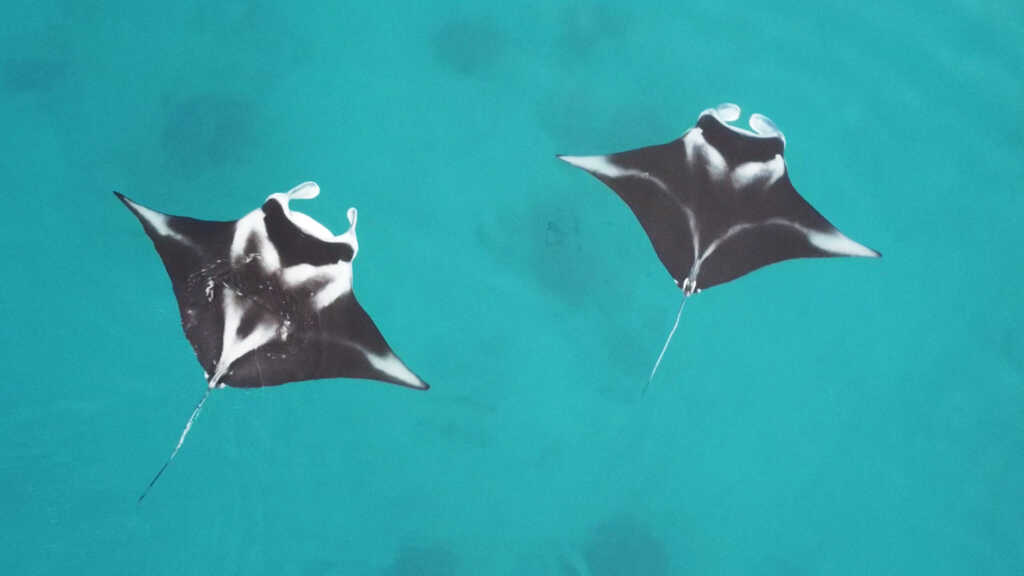
Manta rays are one of the conservation focuses within Raja Ampat MPAs’ Network managed by the Marine Park’s Authority. (Photo by: Muhamad Izuan-KI/2022)
When contacted about the Blue Parks award, the Head of Raja Ampat’s Marine Park Authority, Syafri, S.Pi., stated, “It is a wonderful honor to receive this gold Blue Parks award. We are proud to be a part of the Blue Parks Network to build a strong global network of well-managed marine areas. In Raja Ampat, we want to continue to strengthen management to promote ocean health and ensure food and natural resource sustainability for our children and generations to come.”
West Papua’s Program Director from KI, Meity Ursula Mongdong, welcomed the award, “We are thrilled to see the Raja Ampat MPA network recognized as part of the prestigious Blue Parks network. Raja Ampat is setting the example for other MPA development and management in West Papua and around Indonesia, providing an example of how strong and inclusive management can benefit local communities today and for future generations.”
Muhammad Ilman, YKAN’s Marine Program Director, emphasized, “This (award) proves that collaboration is the key to successful conservation area management. In the future, we hope that the well-established cooperation can be further enhanced to make Raja Ampat an example of a marine conservation area that provides both ecological and socio-economic benefits.”
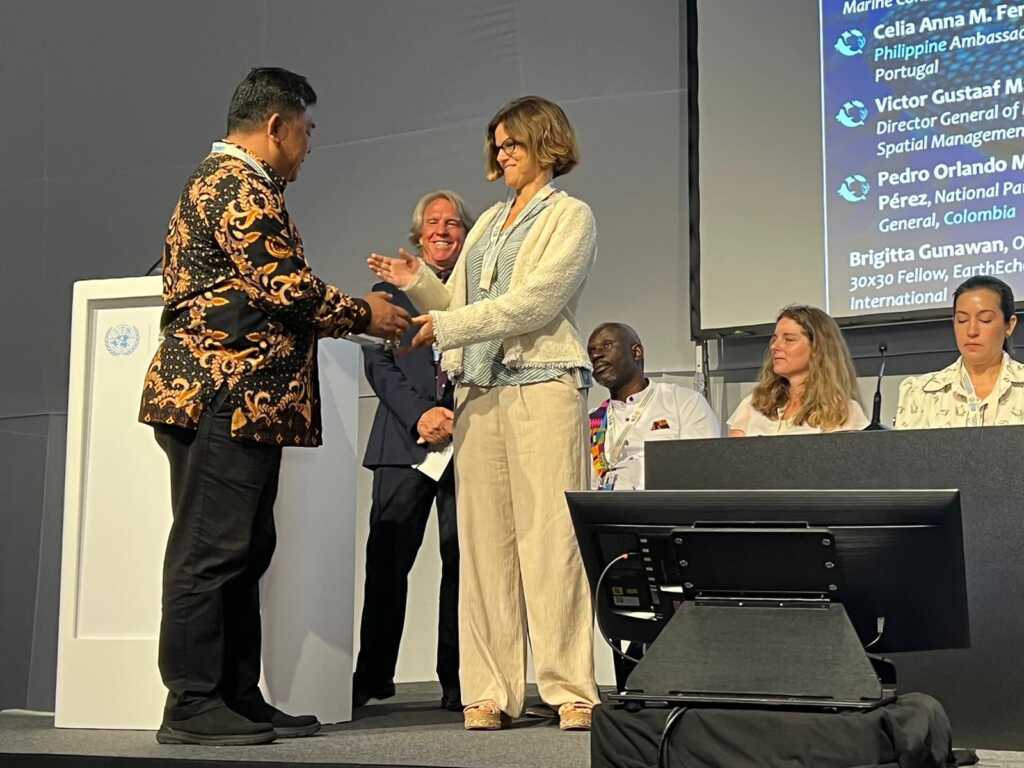
The Director General of the Ministry of Marine and Fisheries’ Marine Spatial Management, Drs. Victor Gustaaf Manoppo, received the Blue Parks award from Dr. Lance Morgan, the President of MCI. (Photo by: CI/2022)
While the Director General of Marine Spatial Management from the Indonesia’s Ministry of Marine and Fisheries, Drs. Victor Gustaaf Manoppo, MH., representing Raja Ampat MPA network, received the Blue Parks award from the President of MCI, Dr. Lance Morgan, across the globe ‘Manu had just finished the reef monitoring project. Arriving in Waisai, ‘Manu went to the office to pick up his orders for the next patrol. Soon he’d be back on “Manta Ray with his Jaga Laut mates safeguarding the newest member of the Blue Park network and doing the work necessary to ensure the communities they served benefited from the thriving marine environment surrounding them.
* Nikka Gunadharma is the Raja Ampat Communication & Outreach Coordinator forKonservasi Indonesia.
** Allan Fredrik Ramandey is the Data and Information Officer for Raja Ampat Marine Park’s Authority.
*** RAJA AMPAT’S MARINE PARK AUTHORITY
The official name for Raja Ampat’s Marine Park Authority is “Badan Layanan Umum Daerah Unit Pelaksana Teknis Daerah (BLUD UPTD) Pengelolaan Kawasan Konservasi (KK) di Perairan Kepulauan Raja Ampat.” It is a technical unit under the West Papua’s Marine and Tourism Agency, and is currently, and officially, manage six Marine Protected Areas (MPAs) in Raja Ampat: Area I – Ayau-Asia Islands MPA; Area II – Mayalibit Bay MPA; Area III – Dampier Strait MPA; Area IV – Misool Islands MPA; Area V – Kofiau-Boo Islands MPA, and; Area VI – Fam Islands MPA. Raja Ampat’s Marine Park Authority also provides technical support for the MPA in Raja Ampat that is manage by the central government, which is West Waigeo Islands Marine Reserve (Wayag). For further information, kindly visit www.kkprajampat.com (Bahasa Indonesia) atau www.rajaampatmarinepark.com (English).
**** KONSERVASI INDONESIA
Konservasi Indonesia (KI) is a national foundation that aims to support the sustainable development and protection of critical ecosystems in Indonesia. We believe in the importance of multi-stakeholder partnerships across sectors and jurisdictions to support the preservation of critical ecosystems. We design and deliver innovative nature-based solutions to climate change, using a sustainable landscape–seascape approach to create lasting impacts for people and nature.
KI established strategic partnership with Conservation International (CI), following the closure of its programmatic operations in Indonesia. From three decades of work in Indonesia, CI adapted its strategy by partnering with KI. Our partnership with CI aims to increase the visibility of successes of our work for the international audiences, and to gain access towards global network as well. Kindly visit www.konservasi-id.org for further information.















